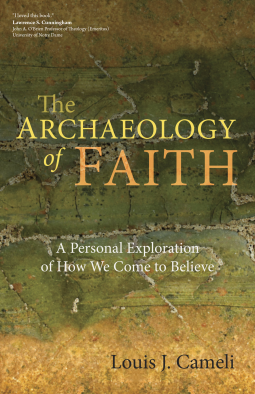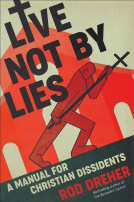
The Archaeology of Faith
A Personal Exploration of How We Come to Believe
by Louis J. Cameli
This title was previously available on NetGalley and is now archived.
Send NetGalley books directly to your Kindle or Kindle app
1
To read on a Kindle or Kindle app, please add kindle@netgalley.com as an approved email address to receive files in your Amazon account. Click here for step-by-step instructions.
2
Also find your Kindle email address within your Amazon account, and enter it here.
Pub Date Mar 23 2015 | Archive Date Jun 01 2015
Description
In The Archaeology of Faith, Fr. Louis Cameli digs into his ancestry to uncover the source of his own faith and invites believers and seekers alike to examine their own faith in the context of history and within the community of the Church.
Tracing the evolution of faith from pre-Christian times in his ancestral village of Grottamare on Italy’s Adriatic coast, Cameli saw how faith intersects with the most basic predicaments of life. While studying the rise of monasticism, he learned that faith is lived in community. As he looked at the medieval raids of Saracen pirates, Cameli found a sense of living with vulnerability. Finally, he realized that trust in God was modeled for him by the relatives who farm the same land today as their ancestors did.
As Cameli studied the rich complexity of faith in his family history, he reflected on his own life, his vocation, and the personal challenges that his beliefs pose. This book is a great read for an individual or small group interested in tracing their own faith ancestry.
Advance Praise
“I loved Louis Cameli's book for the highly readable account of his ancestral Italian home with its dense layers going back from prehistory to the saga of his own immigrant grandparents who ended up in Chicago. Cameli wisely underscores a somewhat hidden truth of Catholic Christianity, namely, that it has a name and a local habitation. This is no trip down nostalgia lane, but rather an example how, like the householder of the Gospel, one brings forth old things and new.”
Lawrence S. Cunningham
John A. O'Brien Professor of Theology (Emeritus)
University of Notre Dame
“With the skill of a seasoned storyteller and the vulnerability of one who is along his own path toward God, Father Louis Cameli draws us in to a complex yet highly readable tale of faith. We are invited to explore, to organize, and to expand our own faith through the prism of historical, cultural, scriptural, and personal stories. The best faith stories I’ve heard are those shared with heart and passion and this book ranks highly among them. Enjoy The Archaeology of Faith and ponder the role of faith in your own story.”
Lisa M. Hendey
Author of The Grace of Yes
“In this finely wrought and deeply personal book, Fr. Cameli explores the many layers of the faith handed down to him and his ongoing appropriation of that faith. In generously sharing his own journey of Christian faith, he richly illumines our own.”
Rev. Robert Imbelli
Associate Professor Emeritus of Theology
Boston College
Marketing Plan
No Marketing Info Available
No Marketing Info Available
Available Editions
| EDITION | Other Format |
| ISBN | 9781594715891 |
| PRICE | $15.95 (USD) |
Average rating from 5 members
Featured Reviews
 Janet P, Reviewer
Janet P, Reviewer
Figuring out the roots of one's faith can be extraordinarily helpful for learning about oneself and for gaining a deeper understanding of our beliefs and how they motivate us.
The author looks at his roots in three ways. First he explores and discusees the way faith and history had an impact on his family, first in Italy and then in America. While his family's story is different from the reader's, we all can look at our family's history and see how it affected how we think, feel, and believe.
Next he looks at himself and the aspects of faith that have been important in his own growth. Doing this allows him, and us when reflecting on it, to understand his faith better and to see how it motivates and enhances his life.This insight helps us, by extension, understand our own.
Finally he looks at four people in the Gospel of John and examines their growth in faith. These in-depth reflections consider Nicodemus, the Samaritan woman, Martha, and Thomas deeply and explains how their faith grew and was affected by their encounters with Jesus.
The chapter begins with a discussion of the particular aspect or situation. Then the author reflects on the wider meaning of it either in his life or in general or both. Finally the chapter ends with a few questions for reflection.
While I thought the writing style was uneven and, too often, used noun phrases instead or more straightforward nouns, there's much that is good in this book.
 Patricia M, Reviewer
Patricia M, Reviewer
I am fascinated by how each of us finds our faith. I wanted to read this book to learn how to unpack my faith history but what I found was so much more than this. I have the privilege of previewing the Archeology of Faith. The author can trace his faith history back 2500 years. Not many people can say this or imagine how this can help define who we are today. My history is a bit spottier than this when it comes to faith. There is a parallel history of Christianity and the author’s personal family history unpacked in each chapter.
Archeology of Faith is divided into three parts. The first part of the book is the author’s personal account of his faith, through exploration of his genealogy. Although the definition of faith can be elusive, Cameli, analyzes what is faith and what is an honest faith in contrast to a distorted faith. The second part of the book is an in-depth explanation of faith as the interaction between us and God in our response to his call in faith. The third part of the book is concentrated on four biblical accounts of faith. Specifically discussed in the latter part of the book, is Nicodemus, the Samaritan woman at the well, Martha and Thomas. This is my favorite part of the book. I thoroughly enjoyed the discussion of the faith of these biblical figures and how we can see ourselves in their stories. I would have loved even more of these stories from the bible explained. This gave me more appreciation of the depth of knowledge and scripture perspective of the author.
I would definitely recommend this book to you. It will help you to look beyond yourself regarding your faith. It’s been said we inherit our faith; this book opens the reader up to this idea and makes it worth exploring. Although this book is written by a priest, I think all Christians would find this book thought provoking. This deeply spiritual book will take the reader on a faith journey, looking at many different aspects of what makes faith meaningful to us all.









